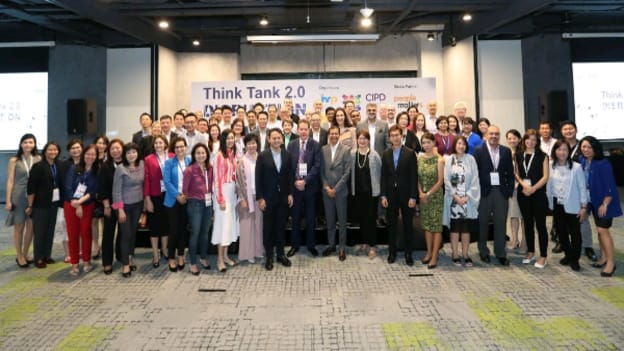Transformational Change and the Future of HR: IHRP-CIPD Think Tank

Gleaning key insights from these experts in the field, topics up for discussion included digital disruption, new technologies, demographic changes, shifting political situations, the shortening shelf life of skills and the necessity of an HR infrastructure that puts people first.
"Stay CURIOUS"
In her opening remarks, Singtel's Group Chief HR Officer, Aileen Tan, highlighted how "the rise of the digital economy means that all of us - HR practitioners - must take proactive steps to ensure our workforce is equipped with the requisite skill sets to take us into the future."
Singtel is making practical decisions to achieve this goal: the company recently announced the ACT initiative, an investment of $S45mn over three years to develop the digital skills of their 12,600 employees. It's hoped this initiative will "transform employee roles to ensure their skills remain relevant."
Tan also showcased Singtel's digital learning app CURIOUS, which provides employees with curated learning channels, allowing employees to take courses on everything from technology to leadership, including analytics, automation and design thinking. By providing flexible, customizable learning journeys to employees, Singtel has managed to maximize engagement, allowing their people to learn more efficiently and reskill at any age and any stage of their careers. As Tan said, "It's never too late to pick up digital skills."
"The future of work is human"
Following on from Aileen Tan, CIPD's CEO Peter Cheese took to the stage to share his thinking on what is currently disrupting our world. While Cheese acknowledged the driving force of digital disruption, he also pointed out that change is occurring everywhere - in politics, the economy, the environment, and across establishment in every part of the world. Cheese stated that now "is an incredibly exciting time and HR should be at the heart of those debates," and went on to remark that he couldn't "recall so much debate about the future of work," at any other point in his career.
Skills gaps remained central to Cheese's discussion, citing research to suggest that "the shelf life of skills is now five years or less." While he acknowledged the need to reskill and upskill to "adapt to the modern world," he emphasized that the "skills we have as human beings" are also truly essential. "We can't predict the jobs, but we can predict the key skills," Cheese said, and highlighted "empathy, innovation, critical thinking, resilience," among the crucial skills that will "bring the human side of work along with technology."
"It's no longer business as usual, so nor should it be HR as usual"
IHRP's Mayank Parekh CEO then took to the stage to talk about the "sea change" happening around the world. Skills were also central to Parekh's discussion, and he outlined the anxiety surrounding talent shortages and the urgent need to train and learn as efficiently as possible. Parekh also talked about sustainable employment, in which businesses "reaffirm their commitment to do more to develop employees and act in socially responsible ways."
"It's no longer business as usual, so nor should it be HR as usual," he said. As technology disrupts how employees do their jobs, HR professionals will also need to be equipped with new skills and competencies to guide and motivate these employees. As Parekh outlined, HR professionals must be a "strategic partner, problem-solver, inspiring storyteller, trusted coach and independent voice to navigate the perspective of employees and employers."
Parekh also announced the renewal of the strategic partnership between IHRP with CIPD for another two years, which is sure to lead to more thought-provoking research and innovative developments in the world of HR.
"How much more effective can learning and development be?"
Finally, Singapore's Minister of State for National Development & Manpower, Zaqy Mohamad used his opening remarks to comment on how HR has transformed over the years and what business leaders now expect from HR. One of these key expectations is that HR leaders will "drive transformational change through change management and strong organizational cultures."
Transformative possibility stayed at the heart of the minister's remarks, as he commented that "HR professionals need to be aware of the opportunities brought about by technological development and prepare themselves to take on new HR roles."
The minister also looked to the transformative power of learning and development when combined with technology, for example through analytics and "bite-sized employee training" that "can be personalized with feedback collected and analyzed in real-time."
When all stakeholders have one common goal!
The second half of the Think Tank was an opportunity for HR, Business, & Government to break up into groups and deep dive into opportunities that disruption is bringing to the fore and what they need from each other to capture those opportunities. The three groups had a chance to ask questions and align with each other in an engaging debate. Fundamentally, the gap between these stakeholders needs to be bridged: HR must talk the business language, Business must leverage their HR teams better, the government should anticipate what's required (one step ahead) and help ecosystem prepare.
HR's role will change in the face of these disruptions, as well as a sense of unique responsibility to help guide employees through this period of unprecedented transformational change. The overriding theme of the IHRP and CIPD ThinkTank was one of optimism, excitement and anticipation for how Business, Government and HR must come together for a common goal.

















